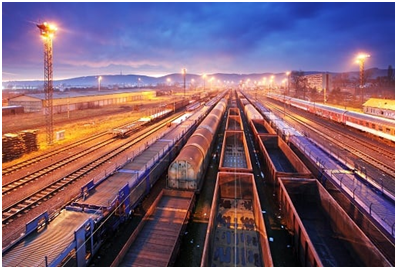
The Dedicated Freight Corridor
Corporation of India Ltd (DFCCIL) under
the Indian Railways is looking to ramp-up its truck-on-train services after
successful trial runs with both perishables (like milk) and non-perishables
(auto components). At present, the DFC
offers truck-on-train services on both the Eastern and Western Dedicated
Freight Corridors.
“So far we have successfully carried out trials for
auto-components, while there are regular services for perishables such as milk
and cattle feed. Depending on demand, we
would like to ramp up services,” a DFCCIL official told.
The
truck-on-train service is one where loaded trucks are directly carried to their
destinations on railway wagons… Konkan
Railways was the first to offer Ro-Ro services as a dedicated facility In
India. Flat BRN wagons (without side walls) with strengthened base, originally
used for carrying steel products, were deployed for RoRo operations.
According to the official, the milk and cattle feed
service was launched in June 2023. The service began with 25 loaded trucks
daily oneither side. The trucks carried milk tankers from Gujarat to the
National Capital Region, and cattle feed for farmers and milk unions on the
return. For 25 trucks, the earnings are
estimated at Rs 8,00,000 per trip.
“At present two trains (with milk and cattle feed) run
on DFC, with truck-on-train services between New Palanpur-New Rewari and New
Rewari-New Palanpur,” the official added.
According
to the official, the truck-on-train service for auto-parts transportation “is
open for all routes of DFC.” However,
at present, the demand does not convert into train load. As of now,
auto-ancillaries are transported through truck-on-train trains.
The truck-on-train service for auto components was
initiated with three trucks travelling from Gurgaon and Manesar to Gujarat’s
Mehsana, with Maruti auto parts. A distance of 700 km was covered in 12 hrs,
which typically takes a day by road.
The Rewari station has the capacity to send such
trains every three hours and around 250 trucks in a day. And the
plan is to expand it to 1,000, another official said.
“We
expect this segment to pick up over the years. The truck operator saves money
on multiple fronts, while the initiative reduces carbon emissions,” the
official said.